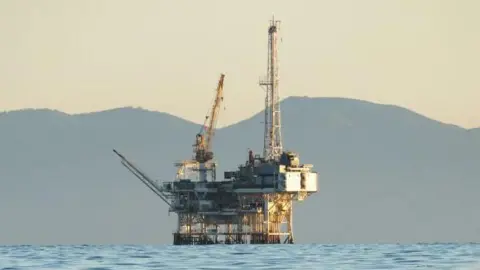 getty images
getty imagesU.S. President Joe Biden announced a ban on new offshore oil and gas drilling along most of the U.S. coastline, weeks ahead of Donald Trump’s inauguration.
The ban applies to the entire Atlantic coast and eastern Gulf of Mexico, as well as the Pacific coasts of California, Oregon and Washington, and parts of the Bering Sea in Alaska.
It is the latest in a series of last-minute climate policy actions by the Biden administration ahead of Trump’s return to the White House.
During his campaign, Trump pledged to “boost” domestic fossil fuel production to lower gas costs, even though the U.S. already has record-high extraction rates.
“My decision reflects what coastal communities, businesses and beachgoers have known for a long time,” Biden said in a statement. “It is unnecessary to meet the energy needs of the world,” he said.
“It’s not worth the risk.”
Trump has promised to reverse Biden’s conservation and climate change policies when he takes office later this month. But the new ban has no end date, and it may be difficult for Republicans to overturn it.
Biden is taking action under the Outer Continental Shelf Lands Act of 1953, which allows the president to revoke mineral leases and drilling areas.
But a 2019 court ruling found the law does not give them legal authority to overturn the previous ban.
Trump himself used the law to protect waters off Florida’s coast in 2020, despite favoring more oil and gas exploration and repeatedly using the slogan “Drill baby, drill” during the campaign.
At the time, this was seen as an effort to win the state’s votes ahead of the 2020 U.S. presidential election, and protections were set to expire in 2032. Biden’s decision would protect the same areas without an expiration date.
The offshore drilling ban announced by Biden applies to more than 625 million acres (253 million hectares) of waters.
After reports emerged last week that Biden would introduce the policy, President Trump’s new spokeswoman, Caroline Levitt, called it a “disgraceful decision.”
She said the move was “designed to exact political revenge on the American people for giving President Trump the authority to increase drilling and lower oil prices.”
However, environmental groups welcomed this move.
“This is a huge win for the oceans,” said Joseph Gordon of the conservation group Oceana.
“Our precious coastal communities are now protected for future generations.”
Oil and gas industry trade groups said Biden’s decision would harm America’s energy security and should be overturned by Congress.
“We urge policymakers to use every tool at their disposal to reverse this politically motivated decision and restore a pro-American energy approach to federal leasing,” said Mike Sommers, president of the American Petroleum Institute. “he said.
During his first term in 2017, Trump sought to overturn former President Barack Obama’s protection of 50.6 million hectares (125 million acres) of the Atlantic and Arctic oceans.
But two years later, a U.S. district court ruled that the law does not allow the president to overturn the decisions of previous administrations. This means Trump cannot revoke Obama’s protections.
President Trump is still expected to challenge Biden’s move. The final legal decision could be made by the Supreme Court, which currently has a majority of Republican justices.
Environmentalists and Democrats have been urging Biden to introduce a new ban over concerns that new drilling would threaten America’s ambitions to reduce greenhouse gas emissions and combat climate change.
The International Energy Agency estimates that global oil and gas demand would need to fall by 5% per year to limit global temperature rises to 1.5C, which is considered critical to avoiding the most devastating impacts.

